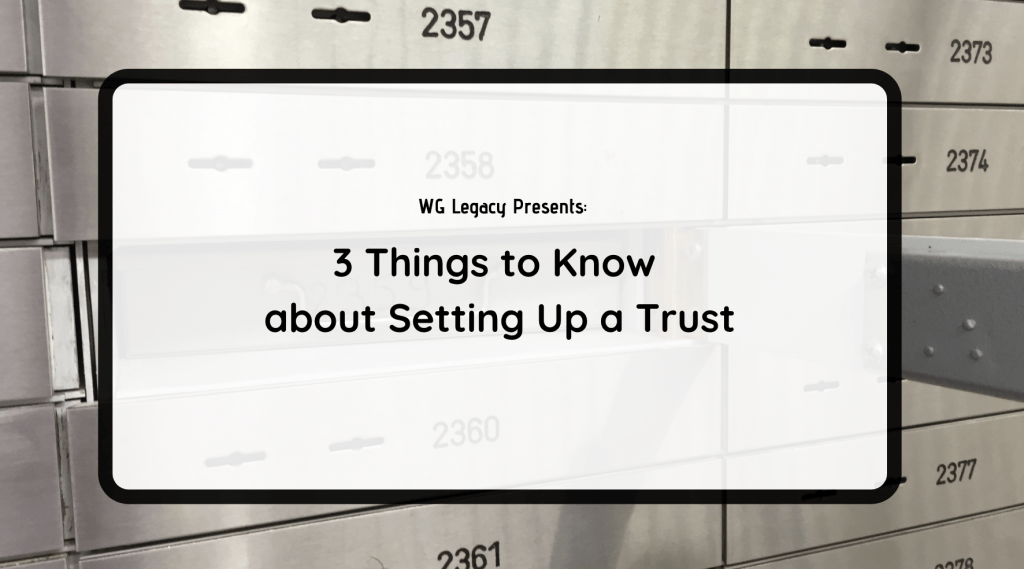Hi, I’m Jocelline, a full-time professional estate planner.
For years, I have been asked questions relating to Trust. Understandably, having a trust or multiples of it is still a fairly foreign concept to most people. As I write today, it is common for trust to be associated with the ultra-rich and wealthy as there is a misconception that one needs to have millions in their bank accounts before establishing a trust.
Here, in this article, I’ll like to address 3 frequently asked questions (FAQs) I had received on trust so that you will have a much better understanding of it. These FAQs are as follow:
a. What exactly is a trust?
b. Who are the main parties involved in a trust establishment?
c. What are the different types of trust that you can establish?
So, let’s begin:
Question 1: What Exactly is a Trust?
To put it simply, a trust is a legal document which details pre-set instructions on how assets are to be distributed and managed, if they are not yet distributed to their beneficiaries.
As such, this leads us to our next question:
Question 2: Who are the Main Parties Involved in a Trust Establishment?
In short, there are 4 main components to establishing a trust:
1. The Settlor:
The settlor is one who establishes the trust. He offers his instructions via a trust deed on the administration of his assets in an occurrence of an event written in his trust deed. These events may include:
a. Death.
b. Total Permanent Disability (TPD).
c. Mentally Incapicitated.
d. Comatosed.
2. The Assets:
They would include:
a. Cash
b. Life Insurance Policies.
c. Real Estates.
d. Shares of companies.
e. Any other belongings as long as they are lawful.
3. The Trustee:
The trustee is the most important component in the establishment of a trust. In an occurrence of any event stated in a trust, the trustee would begin to execute the instructions stipulated in the trust deed by the settlor.
4. The Beneficiaries:
The final component to a trust establishment is its beneficiaries. For most, they include the settlor himself and his family members depending on what types of trust he chooses to set up.
Thus, we shall move onto:
Question 3: What are the Different Types of Trust We Can Establish Today?
Recently, there are many ‘names’ given to a trust.
Perhaps, you may even have heard of some of these trusts. To name a few, they include cash trust, property trust, insurance trust, 3-generational trust and also business trust. These names can be quite fanciful, but they have added to some confusion to most people, including ones who had already set up their trusts.
It is totally understandable.
This is because these trusts are ‘named’ in accordance with the settlor’s wishes to administer a particular asset via a trust establishment. For example, let’s say, I met up with a client and his name is Aaron. Aaron said that he had established a cash trust to administer his cash.
So, what does he mean?
To answer this, I’ll reveal that in essence, there are only three types of trusts:
a. Testamentary Trust
b. Declaration Trust (or Standby Trust)
c. Living Trust
It is possible for Aaron’s cash trust to belong into any of the three trusts above.
With that, let’s take a look at the definition of the three types of trusts:
1. Testamentary Trust
It is a trust that is set up within a will.
The trust will be in effect only upon the death and after the grant of probate.
Thus, it is possible for Aaron’s cash trust to actually be a testamentary trust. For instance, he could instruct his trustee, upon his death, to distribute a figure (let’s say, RM 10,000 a month) to his wife and children (beneficiaries) in his will. There is a trust embedded in his will and Aaron calls it his cash trust.
There are pros and cons to setting up a testamentary trust to handle cash:
Pros:
a. Aaron can decide to whom, when and how much cash is to be distributed after obtaining the Probate from the court.
b. The cash is still in his personal bank account and thus, he can use it freely.
Cons:
a. His cash will be frozen as the trust is embedded within his will.
b. It takes 1+ years for the will to be expedited by the executor of his will.
c. It will take much longer if Aaron did not name an executor in his will.
d. His cash will be frozen if Aaron is comatosed or mentally incapacitated.
e. No one can access his cash to pay for his nursing care and medical expenses.
f. A will can be caveated if one decides to challenge its validity.
2. Declaration Trust (or Standby Trust)
To me, a declaration trust is like having an empty box.
The empty box contains a set of instructions by the settlor to the trustee. In the occurrence of an event stated (could be death, TPD, illness, comatose, … etc) in the empty box (trust), the trustee shall retrieve the assets stated, manage them and distribute them accordingly.
Its settlor shall pass his empty box (trust) to his trustee for safekeeping.
If the settlor is well and fine, the empty box shall remain as it is.
As such, it is possible for Aaron’s cash trust to be a declaration or standby trust. He can instruct his trustee to retrieve cash in all of his bank accounts (Maybank and CIMB for instance) and distribute (let’s say, RM 10,000 a month) to his wife and children (beneficiaries) in the event when Aaron:
a. Pass Away.
b. TPD.
c. Comatosed.
d. Mentally Incapacitated.
Likewise, there are pros and cons to a declaration trust in handling cash.
Pros:
a. Aaron can decide to whom, when and how much cash is to be distributed.
b. The cash is still in his personal bank account and thus, he can use it freely.
c. It is a faster way to administer cash as compared to a testamentary trust as it bypasses the application of grant of probate from the high court.
d. Aaron could nominate himself as a beneficiary of his trust if he becomes TPD, comatosed and mentally incapacitated).
Cons:
a. Typically, it takes around 2 months for the trustee to collect money from Aaron’s bank accounts.
3. Living Trust
Finally, we have a living trust.
You start by preparing a box, which contains your set of instructions as the settlor. You then transfer your assets, such as cash, into the box. After that, you hand it over to your trustee to manage and distribute during your lifetime.
So, the difference between a declaration trust and a living trust is:
a. Declaration trust is an empty box with instructions.
b. Living trust is a box with instructions and assets (like cash).
Therefore, it is possible for Aaron’s cash trust to be a living trust. Aaron may set up his living trust and parks in an amount (let’s say, RM 100,000). In the event if Aaron:
a. Pass Away.
b. TPD.
c. Comatosed.
d. Mentally Incapacitated.
His trustee shall distribute the money in accordance with the instructions given to his beneficiaries.
Here are the pros and cons to a living trust in handling cash:
Pros:
a. Aaron can decide to whom, when and how much cash is to be distributed.
b. Aaron’s beneficiaries can receive the money from the trust in 7 days.
c. Aaron can nominate himself as a beneficiary of his trust if he becomes TPD, comatosed and mentally incapacitated.
d. Aaron can ask his trustee to pay cash to his caretaker so that the cash can be used to pay for Aaron’s nursing care expenses.
e. Aaron can earn 5%-7% a year in interest for cash parked in his living trust if he remains healthy and able.
Cons:
a. Aaron is not free to use his cash after setting up his ‘cash trust’.
Conclusion:
Trust is simple. It is not complicated.
All in all, there are three types of trusts. Each has its pros and cons.
So, which of the three trusts is suitable for you to set up?
This shall be determined based on your objectives for setting up a trust. If you’ll like a trusted guide to walk you through the full process of setting a trust, you’ll need the assistance of a professional estate planner who specialises in trust related services. As such, you could start by filling up the details below to book yourself a 30-minute consultation session to brainstorm for ideas on how you could set up yours:




